10 years of SOC: Sarajevo Open Centre is interested in the society as a whole
INTERVIEW
On the occasion of the tenth anniversary of SOC, Dobrila Govedarica, executive director of the Open Society Fund in Bosnia and Herzegovina, a donor and long-time friend of Sarajevo Open Centre talked about the progress achieved by this organisation over a short period of time, from the beginnings that were marked by small steps and with a small team, to extraordinary results that already benefit the whole BiH society.
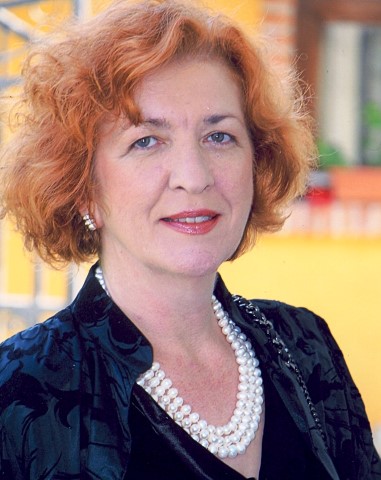
Interview by: Tamara Zablocki
Open Society Fund has supported the work of Sarajevo Open Centre for many years. What kind of potential did you see in SOC, led by its founder Saša Gavrić at the time?
DOBRILA GOVEDARICA: From the very beginning, the Sarajevo Open Centre knew that we were an organisation willing to support the activities of associations working on the protection of human rights of LGBTI persons in Bosnia and Herzegovina, considering that we also supported the first local association of the kind, Association Q, as well as the organisation of the first Queer Festival in Sarajevo, which unfortunately did not unfold as we had hoped it would. We met Sarajevo Open Centre and its founder Saša Gavrić at the beginning of their activities, as a part o the education process. At the time, they were still making small steps and they asked us for help with printing of handbooks about culture of religions. It was already clear to me that these people had far broader interests than LGBTI rights alone. They were actually interested in this society as a whole, regardless of the fact that they belonged to a stigmatized minority and that later, during their strategic development, they had to eliminate some topics, and focus on the others.
You supported the Sarajevo Open Centre through the key period of strengthening and professionalisation. Today we see the results of this progress: SOC is an influential factor in BiH society in the domain of respecting the rights of LGBTI persons. How would you evaluate SOC’s progress over the years?
By making small steps at first, a very young team of Sarajevo Open Centre managed to build a respectable organisation, and I think that by its work, results, transparency, and level of organisation, it belongs to the group of five or maximum ten best civil society organisations in Bosnia and Herzegovina
DOBRILA GOVEDARICA: At the time of our first encounter, Sarajevo Open Centre was a small organisation of a few people. We at the Open Society Fund were concerned as we thought that after the 2008 and the fiasco with the organisation of Queer Festival in Sarajevo, there wouldn’t be another organisation that would work on LGBTI issues and join the public discourse in a long time. However, miracle called Sarajevo Open Centre happened, and they managed to do it in a relatively short timeframe. It is fascinating that in a few years only, they managed to form a team, collect information important for their activities, conduct excellent analyses of laws and public policies, and publish outstanding publications not only about LGBTI rights, but also about women’s rights and feminism, because it is not so common here. You know, producing one single publication requires a lot of work, even for organisations that focus on some kind of publishing as their only activity, because you have to possess the knowledge about content, editing, and know how to make a publication that will perform its original function later. A large majority, almost all civil society organisations are not able to analyse legislation, develop founded proposals supported by arguments, and articulate them properly, whereas the Sarajevo Open Centre learned and proved they can do it over a short period of time, and than they focused on advocacy as the next step in the same process. Practically none of the other organisations work on advocacy, because it is the hardest part. One needs to plead with parliamentarians, politicians who are not even friends of the idea, get rejected five times, and maybe get a chance for a conversation the sixth time. For any topic, not only rights of LGBTI persons, this is the most difficult part of the job, because you need to ask people to talk to you about something that should bring general benefit, while they reject your requests. Persuasion is the key. By making small steps at first, a very young team of Sarajevo Open Centre managed to build a respectable organisation, and I think that by its work, results, transparency, and level of organisation, it belongs to the group of five or maximum ten best civil society organisations in Bosnia and Herzegovina. I have been in this job for 25 years and I met numerous non-governmental organisations, but I rarely witnessed such progressive development and such dedication that I saw in Sarajevo Open Centre, considering that all of them were very young when they started, in their twenties, with scarce working and life experiences. In only five years, they managed to achieve real results, surpassing some organisations that have been active in Bosnia and Herzegovina for twenty years.
What do you think was the key for such continuous rise of Sarajevo Open Centre?
DOBRILA GOVEDARICA: I am confident that the founder of the organisation himself, Saša Gavrić greatly influenced such path of the Sarajevo Open Centre, who obviously knew how to pick the right person to succeed him in the position, Emina Bošnjak. Such stories begin with one person, because one person has a vision, desire to do something, to bring together a team that suits them, and to start working. Saša Gavrić had a vision and the support of his team, but he also had special emotional intelligence which determined his skill to communication with people. Only the rare ones could resist his charm, arguments and general approach, regardless of how rigid attitudes about sexual and gender minorities they had. It was fascinating to watch him talk to parliamentarians, police officers and other groups which we believe are behind the line when it comes to LGBTI rights. Just remember the politicians’ statements about the Queer Festival, when they needed to be reminded of the Constitution and of the Convention on the Protection of Human Rights. And then suddenly the Sarajevo Open Centre appeared, led by Saša Gavrić, and dismantled all that. Of course, I don’t think that the situation is ideal today or that it will become ideal in the near future, or that conservative thinking about sexual minorities will disappear, but I think that decision makers and a large number of citizens heard about sexual minorities thanks to SOC, which was certainly contributed to by the improvement of overall climate in the region when it comes to visibility of LGBTI persons. I still cannot imagine the day when the gay pride will take place in Sarajevo, but things are changing for the better.
I am not carried away by thinking that the situation of LGBTI persons is automatically better in Bosnia and Herzegovina, because it takes time, but Sarajevo Open Centre deserves the most credit for the fact that conditions have been provided for someone whose rights have been jeopardised because they are an LGBTI person to solve their problem by legal means
Why is it that you can’t imagine the day when the gay pride will take place in Sarajevo?
DOBRILA GOVEDARICA: It is because I fear that there wouldn’t be enough brave members of sexual minorities out there who would lead the parade, because it is not sufficient that I and hundreds of people like me come to the parade to support them. And members of sexual minorities would not go out for various reasons: family relations, situation at work, and I can definitely understand those people. I do not judge them because I know that one must evaluate one’s gains and losses in life. The state of spirit in Bosnia and Herzegovina is such that sometimes it seems to me that we returned a hundred years to the past compared to the time when I was young, and seeing that the evolution theory is being eliminated from the school syllabuses, I am wondering how far we will go. In such environment, the Sarajevo Open Centre managed to achieve great things, from amendments to the Anti-Discrimination Law and onwards, where they played the key role. Their amendments went through the legislative process and were adopted, and if there weren’t for them, nobody would have advocate for their adoption. That is why I think it is fantastic for Bosnia and Herzegovina. And that is why I say that small groups of brave people are important, individually brave at first, and then joined together.
What are some of the most important achievements of Sarajevo Open Centre with respect to everyday life of LGBTI people in Bosnia and Herzegovina?
DOBRILA GOVEDARICA: Trainings of the police and medical workers were very important in the work of Sarajevo Open Centre, but the very fact that managers agreed to such trainings speaks a lot about abilities of the SOC team. The fact that the Sarajevo Canton Ministry of Interior accepted to be a part of this story is revolutionary, I would say, because it sensitises police officers for LGBTI issues. It is very important to sensitise the people who may be asked for help by members of sexual minorities one day, and these are police officers and medical workers. If we put the laws aside, because laws in this country are often only a dead letter, the direct contact of members of a completely stigmatized group with the police and medical workers requires great courage and psychological stability, and the response of the police and medical workers is therefore very important. In a society like this, it is not at all simple to have the police officers and medical workers complete trainings that will help them provide adequate response to problems of LGBTI people. I am not carried away by thinking that the situation of LGBTI persons is automatically better in Bosnia and Herzegovina, because it takes time, but Sarajevo Open Centre deserves the most credit for the fact that conditions have been provided for someone whose rights have been jeopardised because they are an LGBTI person to solve their problem by legal means. Until yesterday, such person had no legal means to solve the issue.
What awaits the Sarajevo Open Centre in their future work? What could be their next goals that would be important for BiH society?
DOBRILA GOVEDARICA: Accepting the LGBTI community as equal in the society means huge civilisation shift, and it certainly is a long-term endeavour. Talking to members of the Sarajevo Open Centre about their future plans, I learned that their future plans have to do with the law on same-sex partnerships. I think that their third attempt in that direction will be successful. The first attempt will face a very bad reaction: I don’t think that anybody in the parliament will be willing to talk about it seriously, and some ugly articles will be published in the rightist media. On the second attempt, it will already be an old story, and it will be possible to convince one group in the parliament that this law is important. They will definitely succeed the third time because, at least I hope, the generation of politicians will change at last; the same people will no longer be sitting in the parliament, and the rest of the world will be so far ahead in the domain of LGBTI rights that the same-sex partnership issue will be a minor shift at that point. The world is already very advanced: my colleague in Spain is gay, he has a partner and the two of them adopted two children. This is not a revolutionary thing over there, and their parents treat them and their children just like parents of any married couple we know would behave. This is how things should be, because if I do not threaten anyone with my lifestyle, who has the right to interfere and tell me how am I supposed to live? I believe that the level of awareness will rise here in the next ten years, and that the law on same-sex partnerships might be adopted then. I think that the advantage of today’s generations lies in the fact that all kinds of information are available to them thanks to the internet, which prevents ignorance about global trends.
Pia Hallonsten, the first secretary of Swedish International Development Agency (SIDA), Embassy of Sweden in BiH
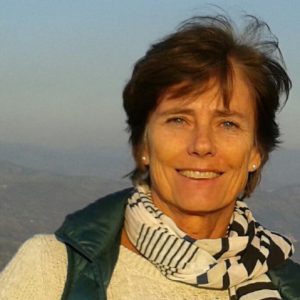 SOC shows how a well set system yields good results
SOC shows how a well set system yields good results
As a SIDA employee, I had the honour and privilege to follow SOC’s path over the past three years. It clearly shows how a well set system yields good results.
Theory of change, a clear matrix of results with good indicators, monitoring the implementation, a strong and engaged management, stable internal procedures, transparency, providing sustainable results, a new strategic plan based on results and lessons learned – all of these constitute typical example of how planning and a well designed strategic plan with an extraordinary framework of results establish perfect conditions for institutional support. I wish that all support to civil society would look like this. This example perfectly illustrates how it pays off to provide strategic donor support for a pre-defined results framework, with preliminary assessment.
10 yearssoc
 10 years of SOC: Back to Silence – Never Again
10 years of SOC: Back to Silence – Never Again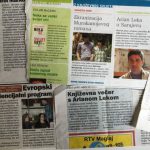 10 years of SOC: From Poetics to Payment Slips, From Culture to Bureaucracy
10 years of SOC: From Poetics to Payment Slips, From Culture to Bureaucracy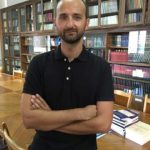 10 years of SOC: How LGBTI Rights and Freedoms were Ushered into Institutions
10 years of SOC: How LGBTI Rights and Freedoms were Ushered into Institutions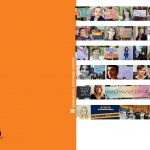 10 years of SOC: Battles Worth Waging are Best Waged Together
10 years of SOC: Battles Worth Waging are Best Waged Together 10 years of SOC: Change the World Around You
10 years of SOC: Change the World Around You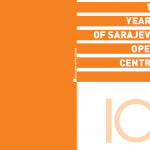 10 years of Sarajevo Open Centre
10 years of Sarajevo Open Centre